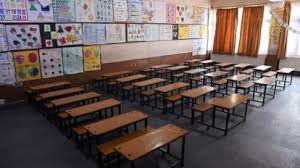Schools are reopening in Kashmir, but not everyone’s happy: ‘Decision made from AC rooms’

Srinagar: As schools across Kashmir reopened this week after the winter break, a chill hung in the air—not just from the sub-zero temperatures, but from the anger simmering among parents and educators. Many feel the government’s decision to reopen schools in the freezing month of January was taken without consulting stakeholders on the ground.
Students in uniforms trudged through snow-covered streets, their breath visible in the icy air. Inside classrooms, heaters barely made a dent against the biting cold. While education officials defended the move, families and teachers were less convinced.
“We Want to Send Them, But It’s Just Too Cold”
In Baramulla, a mother of two stood at the school gate, visibly concerned. “I want my children to study,” she said, “but how can they focus when they’re shivering inside classrooms with no proper heating?”
The Kashmir Valley is currently in the grip of ‘Chillai Kalan’—the harshest 40-day winter period. Temperatures have consistently dipped below -5°C, and in many areas, roads remain covered in black ice, making travel risky.
Parents argue that the reopening ignored these realities. “The decision was made from air-conditioned offices in Delhi or Jammu,” said a father from Anantnag. “They don’t understand what it feels like to sit in a classroom that’s colder than outside.”
Teachers Voice Their Frustration Too
It’s not just parents who are upset. Several teachers across Srinagar and Kupwara shared similar concerns.
“We were not consulted at all,” said a government school teacher from Sopore. “There’s no running water in the bathrooms because the pipes are frozen. Basic facilities like heating or hot drinking water are absent.”
The Jammu and Kashmir Teachers Forum (JKTF) also criticized the reopening timeline. In a press release, they urged the administration to reconsider the schedule and prioritize student health over calendar targets.
Education Officials Defend the Move
However, the Directorate of School Education Kashmir (DSEK) maintained that the reopening was necessary to make up for learning loss post-pandemic and due to previous disruptions. “We have instructed all schools to ensure heating arrangements are in place,” a senior official said.
The official also pointed out that private schools had been charging full tuition even during winter months. “Parents expect online or in-person teaching in return,” he argued.
But that explanation hasn’t satisfied critics. “If the decision was about fairness or learning loss, why not provide thermal wear, transport facilities, or at least proper heating?” asked a local journalist covering education issues in the valley.
Students Caught in the Middle
For students, the experience has been mixed. Some were excited to meet friends again, but many complained of cold fingers, runny noses, and numb toes. “We can’t even hold our pens for long,” said Zoya, a Class 8 student in Pulwama. “How are we supposed to write notes or concentrate?”
Others mentioned power cuts disrupting lessons. “Half the time the lights go out, and our smart classroom systems don’t work,” said a high school student from Ganderbal.
A Pattern of Ignoring Local Realities?
This isn’t the first time winter reopening decisions in Kashmir have come under fire. Education experts say the calendar should reflect regional climate differences, not follow a one-size-fits-all national template.
“In Kashmir, winters are harsh and last till late February. Forcing schools to open in January isn’t practical,” said a former school principal from Shopian. “It’s not just about education; it’s about student well-being.”
Several parents echoed this view. “Our children are not numbers in a file,” said a parent in Bandipora. “They are human beings, and we are not ready to risk their health just to meet some bureaucratic deadline.”
What Could Have Been Done Differently?
Education activists suggest that a hybrid model could have worked better. “If the government had consulted teachers, students, and parents, they could’ve created a plan that balances safety with learning,” said Syed Mujtaba, a Srinagar-based education advocate.
Suggestions included online classes till mid-February, provision of heating grants for schools, or staggered reopening based on district weather conditions.
Final Word: Caught Between Policy and Weather
As Kashmir continues to battle freezing nights and frosty mornings, the school reopening debate has highlighted a larger disconnect between policy-makers and local ground realities.
For now, children continue to attend school wrapped in layers, and teachers do their best to maintain focus despite the cold. But the central question remains: Should academic calendars override climatic challenges?
As a schoolteacher in Pulwama put it, “Education is important. But only if it doesn’t come at the cost of a child’s health.”






